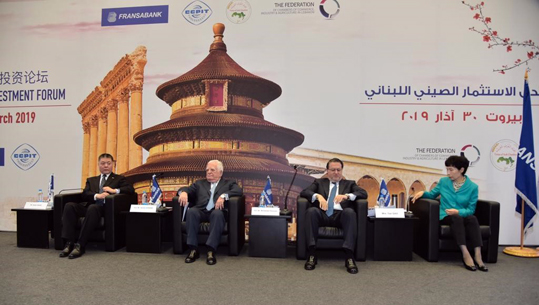The Union of Arab Chambers hosted a Chinese Economic Delegation spearheaded by Ms. Gao Yan, the President of China Council for the Promotion of International Trade (CCPIT). The delegation included 100 personalities representing the largest Chinese companies, in addition to the participation of Mr. Mohamad Choucair, the Lebanese Minister of Communications and the President of the Federation of Lebanese Chambers, Mr. Mansour Bteich, the Lebanese Minister of Economy and representatives of Lebanese and Chinese businesses.
Mr. Adnan Kassar, the Honorary President of the Union of Arab Chambers said in a statement that "Lebanon plays a strategic role in the initiative of the belt and the road launched by the Chinese president." He pointed out that "activating the Sino-Lebanese joint cooperation would achieve mutual benefit and win-win partnerships," hoping that the Chinese companies to enhance their investments in Lebanon in various key sectors."
His excellency also stressed that "the formation of a new government in Lebanon gave investors greater confidence, and the common goal of the private and public sectors in Lebanon is to restore Lebanon’s role as a regional center for business, investment, logistics, transport, tourism and finance."
Yan
Ms. Gao Yan, the Chairperson of CCPIT had a speech during the forum stating: "The increase in the volume of the mutual investments has led to the promotion of trade between China and Lebanon." She added "we must continue to develop these relations and increase opportunities for joint cooperation." She also proposed "to increase the volume of the Sino-Lebanese joint investment, enhance cooperation in infrastructure and in tourism, and benefit from the belt and road initiative in this field."
Kejian
The Chinese ambassador Wang Kejian stressed “the importance of activating the cooperation between China and Lebanon in the framework of the road initiative for the benefit of both countries, and exchanging experiences and cooperation on the basis of mutual benefit and deepening cooperation in the framework of this initiative which contributes to supporting the economic and social growth in Lebanon.
Choucair
Mohamad Choucair, the Lebanese Minister of Telecommunications stressed in his speech that "the economic relations between Lebanon and China are concentrated on the bilateral trade, and in this context, we can notice a big imbalance in the trade balance for China, at an annual rate of more than two billion dollars, which is a big figure for Lebanon," he added “we are talking about this frankly and transparently, because we want to continue the momentum in our economic relations, which we want to progress and develop and to see a kind of balance. It is true that in previous periods we had several attempts to increase our exports to China, but the results were not as good as we hoped, so we hope to achieve this balance in other sectors, especially in Investment. In this area, I think that the atmosphere is very qualified, with the economic expansion policy adopted by China through investment globally, including our region and Lebanon in particular, which is a key center on the Silk Road."
Hanafy
Dr. Khaled Hanafy, the Secretary-General of the Union of Arab Chambers touched in his speech the reality of the economic relations between the Arab countries and the People's Republic of China, revealing that the trade between China and the Arab world reached 200 billion dollars in 2017, pointing out that the trend indicates that China's trade with the world Arab region will exceed 300 billion dollars before 2025.
Hanafy explained that the Arab countries hold about one-third of the world's total oil reserves and have an unrivaled infrastructure for transporting and refining oil. Pointing out that "the Arab fuels account for 30 percent of the total imported fuel in China and account for 80 percent of all Arab exports, especially oil.”
"China relies heavily on maritime transport, with 90 percent of China's exports coming from water channels. The four major corridors in the Arab region, namely, Hormuz, Bab al-Mandab, Gibraltar and the Suez Canal, are located in the Arab region, knowing that half of China's imports of oil and a quarter of its imports of natural gas pass through these vital channels."
Hanafy stressed that "the Chinese economy is the second largest economy in the world after the United States of America, and for the Arab world, China is a good partner for cooperation to diversify its sources of export and attract the Asian investments."
Fenianos
Mr. Youssef Fenianos, the Lebanese Minister of Public Works and Transportation said "the Silk Road, dating back to 200 BC, is now overlooking us by land and sea, linking the East and the West with a length of ten thousand kilometers from China to Europe, through Kazakhstan and Russia," and “who controls this road, controls the world in a geo-strategic and geo-political dimension, and what links Beirut and Chunxing is a history that extends along transport and trade."
Abou Faour
The Minister of Industry in Lebanon Wael Abou Faour said, "the forum is an opportunity to develop the Lebanese-Chinese relations in all fields, especially in the field of industry that has suffered historically and suffers today due to the absence of the required measures from the successive governments to sponsor and support the industry.” He added “Everyone is aware that there is a huge imbalance in the trade balance of Lebanon and other countries of the world, and that we import about 20 billion dollars and export goods for less than 3 billion dollars, and this crisis is not a trade one but a major economic crisis, which generated financial and non-financial crises, and the treatment lies in restoring the minimum balance.”

